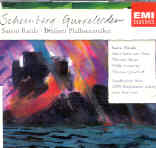Bad recordings of Schoenberg’s Gurrelieder are hard to come by because the composer made it so easy to produce good ones. Schoenberg meticulously wrote down everything he wanted: dynamics, tempos, timbre, even marking the motives with the direction “prominent” in myriad places. Despite the fact that this massive work employs a battery of 400 musicians (give or take a few), a competent conductor needs only good traffic management skills rather than interpretational flair to produce a convincing performance. As a result, fine recordings by Chailly, Ozawa, Boulez, Sinopoli, Kegel, Ferencsik, and Inbal bless the current catalog. Simon Rattle’s new rendition–on the whole, slower in tempo than the widely admired versions by Chailly and Ozawa–does not noticeably improve upon existing versions and falls short of being a truly great recording technically.
The subtext of Rattle’s performance rests in the rather minor epiphany described in his liner note interview that Gurrelieder is “in fact the world’s largest string quartet…the most gigantic chamber music ever written and should be very transparent.” He amplifies this view by comparing the piece to Ravel’s Daphnis et Chloé, insisting that the two pieces share a “French sensibility and finesse.” Of course, even a cursory glance at the score would demonstrate that there are only a few sections where the full orchestra (and chorus) play at once, so Rattle’s not terribly original revelation simply reinforces the obvious.
It also comes as no surprise that the most successful portions of Rattle’s performance are those in which the orchestration is sparse and the dynamics are soft. Exquisite examples occur in the opening prelude, especially in the interplay with the English horn, bass clarinet, and bassoon just before Waldemar’s first entrance, in the lovely clarinet line that presages Tove’s love song at rehearsal number 50, and in the shimmering harps and flute interlude just before Waldemar’s frantic horse-ride to Gurre.
The big climaxes are a whole different story. The main problem in these crucial sections centers on the sound engineering. A persistent veil hangs over this recording, sporadically resulting in unusual balances, limited dynamic range, and sonic congestion that chiefly affects the percussion. The Berlin Philharmonic itself is also partly to blame, suffering here (and elsewhere–its recent Turangalila Symphony with Kent Nagano on Teldec, for example) from tepid brass playing. At the feverish end of Tove’s second song, listen to how six trombones, two horns, and a bass trumpet playing at triple-forte manage to get drowned out by a single timpanist and a couple of bass-drum thwacks. With the exception of the big choral section in the “Wilde Jagd”, the Berliners hardly ever achieve a true triple-forte without the ensemble fraying at the edges. In particular, at the big close to Waldemar’s second song (the horse-ride again) and during the brief Presto section ending the Peasant’s peroration in Part 3, the imprecision in the percussion (despite Schoenberg’s very specific instructions) and general welter may well make you want to do as the Peasant implores and “cover [your] ears with a blanket.”
Rattle’s choice of vocal soloists comes up a mixed bag as well. As the protagonists, Thomas Moser and Karita Mattila simply do not compare in style and character to their counterparts, Siegfried Jerusalem and Susan Dunn, on Chailly’s magnificent recording. For his part, Moser employs his “bari-tenor” timbre to great effect in the reflective, moodier moments but he really strains in the heroic passages, particularly when he is called upon to sing at or above high-A. Mattila also sounds patchy at times. Her thick soprano timbre has no “silver” at all on this outing and thus, rather than singing like a latter-day Isolde with eager exuberance, she sounds matronly. Her waltz section in the second song drags and slithers without any rhythmic verve (Rattle’s fault too), and her final high-B (the “rapturous kiss”) simply does not astound like Dunn’s.
The supernumeraries are much better. Anne Sofie von Otter’s Wood-Dove is marvelous and one of the highlights of this disc. Similarly, Thomas Quasthoff as both the Peasant and Speaker is in fine voice (although his “Ach!” in the Melodrama just before the Sunrise section is just too much) and Philip Langridge does a nice turn as Klaus-Narr. Finally, the massed choruses (the men, in particular) project robustly but are less-than-spine-tingling in the great C-major finale. It may be that no version of this musical epic gets everything right, but there are others available that do a better job than Rattle and his crew here: there’s nothing bad, mind you, but nothing spectacular other than some exquisite soft playing. Would that Rattle and his engineers had lavished equal care on those few, crucial big moments!
































